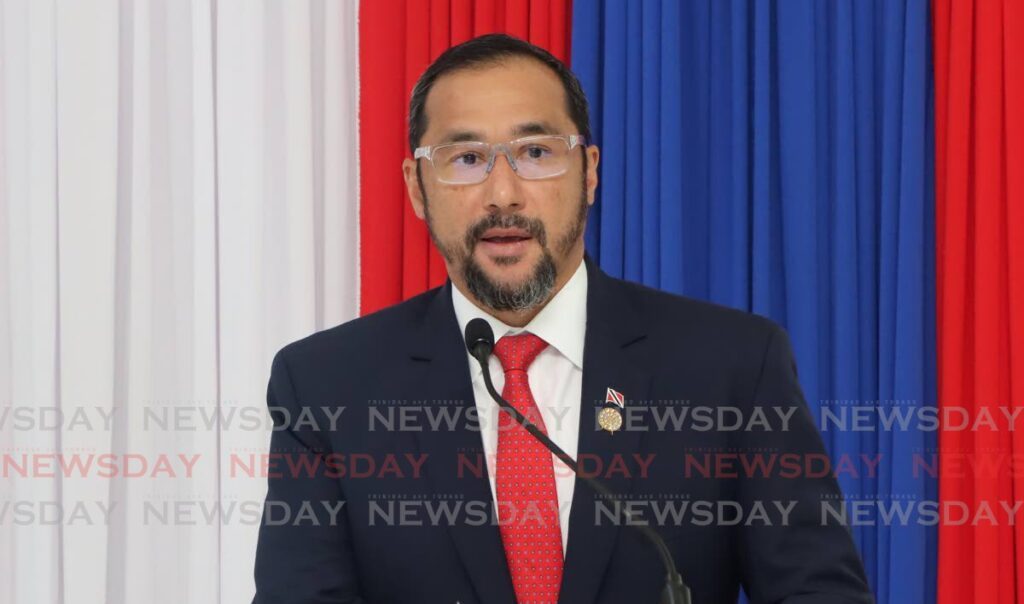Young: Shipping industry can fix forex issues

PRIME Minister Stuart Young says the potential effect of US tariffs on regional shipping was raised during bilateral discussions in Jamaica with US Secretary of State Marco Rubio on March 26.
Young gave some insight into discussions surrounding the tariffs while speaking at the Shipping Associations 87th annual general meeting at the Cruise Ship Complex in Port of Spain on March 28.
He said Caricom leaders, several days earlier at the Caricom Head of Government meeting, noted the tariffs being placed on other countries that trade with the US could indirectly affect Caricom countries.
Young said, additionally, there are concerns over plans to charge shipping companies exorbitant port fees if they have Chinese-built ships in their fleet or have placed orders for such ships.
The US Trade Representative's office has proposed charging up to US $1.5 million for Chinese-built vessels entering US ports.
US president Donald Trump says the planned fees will revitalise the US shipbuilding industry and curb China's growing commercial and military dominance on the high seas.
“As I told Secretary Rubio, I don't have the statistics, but I would find it very hard to believe that any global shipping fleet does not fall into one of those two categories.
“I made the case for us in Trinidad and Tobago, as well as the Caricom region, of how detrimental that would be to our citizens in this region, where we are very small players… and we really are not the ones who are affecting trade in the manner that their policy is aimed at.”
Young told the shipping association members he believes their industry can play a massive role in another issue facing TT, the lack of foreign exchange currency.
Noting there is no “magic pill” to address the shortage, Young said he is working hard to tackle the situation and assist “the average people” who may not be able to access forex.
“The shipping industry has a serious role to be able to contribute in those things. And hopefully, if you do it properly, not only become a net user of foreign exchange, because there's that potential, but even an earner of foreign exchange for TT.
He called for a collaborative approach between the government and stakeholders to determine what areas can increase foreign exchange revenue and drive those areas.
“There's a certain parts of the shipping industry, the dry docking facilities, the services industry, that will earn the foreign exchange.”
Young said despite the region accounting for less than one percent of the worldwide shipping trade, TT has the infrastructure and the potential to become a premier maritime service hub for commercial and industrial vessels in the region.
He pointed to the establishment of the special economic zones throughout TT as an excellent contributor to the allure of TT as a prime hub.
“Next to a state-of-the-art port that we will invest more in, if the traffic is coming through, there is the ability to set up in these economic zones, where you're exempt from taxation, import, customs duties, and these types of taxes.”
“It will create new revenue streams in container handling, customer brokerage, freight forwarding, with leading economic zones favouring trade with geographically closer and politically stable partners.”
He said TT will be able to attract manufacturing investments in value-adding processing, light assembly, and re-export logistics.
He added enhanced shipping connectivity to North America, Central America and Brazil can also position TT as a competitive alternative in regional supply chains.
Young said the shipping industry has been targeted by the government as a key economic diversification tool with several niche maritime industries presenting additional opportunities for economic growth.
“Countries in the global south can expand their industrial base by capturing supply chain realignments, reducing dependence on a single market and investment in our special economic zones.
“Duty-free processing areas can attract manufacturers looking to bypass traditional trade territories and leverage access to new markets. Increased trade between Caribbean, Latin America, and African economies will reduce reliance on traditional supply chains.”
He said TT can also capitalise on increasing maritime trade through the Caribbean by expanding bunkering services to cater to transitioning vessels in its territorial waters.
“This would strengthen TT’s foreign vessel service package by integrating bunkering with coal stacking, ship repair, transshipment services, making the country a one-step hub for maritime logistics.”
He said apart from earning foreign currency, this can also lead to increased employment.
Young said these plans will dovetail with the government’s push to improve the efficieny of port operations.
“The Ministry of Trade and Industry is currently implementing the Port Community System, which is aimed at integrating the IT platforms of Customs, the Ports, and TT BizLink to enable seamless data exchange and improve the efficiency of import and export clearances through the Port Community System.
He said businesses will benefit from faster, more reliable port operations, leading to cost savings and improved service delivery.
“It is expected that the system will significantly reduce lead times, mitigate bottlenecks, and enhance the attractiveness of TT’s ports. Our connectivity to regional and global markets makes this country an attractive location for maritime services.”

Comments
"Young: Shipping industry can fix forex issues"